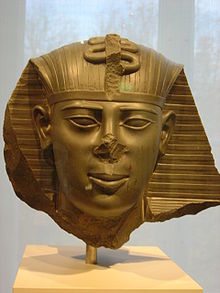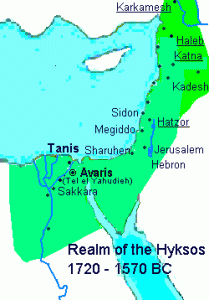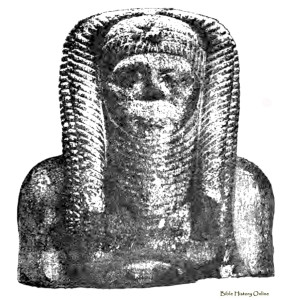Amasis
Amasis
Amasis II, was the Greek name of Ahmose who reigned from 570-526 BC. Amasis is given by Plato as the  name of the Egyptian pharaoh at the time of Solon’s visit to Sais. However, Phyllis Young Forsyth[266.38] protests that Plato did not claim that Amasis was on the throne at the time of Solon’s visit, but merely identified Sais as the home of Amasis. The English translations of Tim.21e by Bury, Jowett and Lee are compatible with this, as is the German translation of Plato’s text by Franz Susemihl(a). John Michael Greer[0345], among others, supports this view.
name of the Egyptian pharaoh at the time of Solon’s visit to Sais. However, Phyllis Young Forsyth[266.38] protests that Plato did not claim that Amasis was on the throne at the time of Solon’s visit, but merely identified Sais as the home of Amasis. The English translations of Tim.21e by Bury, Jowett and Lee are compatible with this, as is the German translation of Plato’s text by Franz Susemihl(a). John Michael Greer[0345], among others, supports this view.
Firm historical information for this period is often scanty and sometimes contradictory. However, it is thought that Solon left Athens for a number of years and some of that period may have overlapped with part of Amasis’ reign. Herodotus is our principal source of information regarding Amasis and he clearly mentions (Bk.1.30) that Solon was at the court of Amasis. Zhirov quotes the views of V.S. Struve, who believed that Herodotus’ 3rd century BC dates were out by 25 years.
Ivan Linforth strongly disputes[041.300] the idea of Solon meeting Amasis as “chronologically quite improbable”. He claims that Solon (c.630-560 BC) had returned to Athens before the reign of Amasis. John Michael Greer[0345.15], not very convincingly, attempts to counter this idea with the suggestion that at the time of Solon’s visit, Amasis had not yet ascended the throne.
>A more recent refutation of the claim that Plato’s reference to Amasis is an anachronism is offered Diego Ratti(b).<
(a) https://web.archive.org/web/20180901011839/https://atlantis-schoppe.de/susemihl.pdf
(b) Solon and anachronism issue (archive.org) *
Hyksos
 The Hyksos is the name applied to two dynasties of foreign kings who ruled Egypt around 1650-1530 BC(a). Gerard Gertoux suggests three dynasties reigning from circa 1750- 1530!(l) They are generally accepted to have been Semitic people, from an unknown land, who invaded Egypt around 1710 BC. They ruled for over a hundred years until defeated by the Egyptian Pharaoh Amasis I.
The Hyksos is the name applied to two dynasties of foreign kings who ruled Egypt around 1650-1530 BC(a). Gerard Gertoux suggests three dynasties reigning from circa 1750- 1530!(l) They are generally accepted to have been Semitic people, from an unknown land, who invaded Egypt around 1710 BC. They ruled for over a hundred years until defeated by the Egyptian Pharaoh Amasis I.
Their name was originally taken to mean ‘Shepherd Kings, but more recently, it is accepted that the Egyptian term ‘heqa-khase’ which means ‘rulers of foreign lands’ gives us a simple but credible title of ‘Foreign Kings’. It has been suggested by David J. Gibson (1904-1966) that the modern interpretation indicated that the Hyksos ruled a vast empire and has devoted a book[1507] to justifying this view(g). This empire lay mainly to the east of Egypt with the possible exception of Crete. Gibson identifies the Hyksos with the biblical Edomites!
Walter Baucum summarises his view on the subject as follows, “The Early Hyksos Shepherd Rulers of Egypt were descendants of Shem and identical with Typhon and the Titans, the peoples of Set, and to some degree with the Hebrews. The early Hyksos were to a large degree Israelites but after they left, the Amalekites conquered Egypt and were also referred to as Hyksos”.
This identification of the Hyksos with the biblical Amalakites was supported by Velikovsky, Rohl and Donovan Courville(o). This identification is disputed by Emmet Sweeney [1867], who is generally sympathetic to Velikovsky’s revised chronology, but disagrees with him in this instance. In a recent (2023) paper(r) on the Academia.edu website Donald Keith Mills was highly critical of Velikovsky’s research on the Hyksos and Amalakites in Ages in Chaos.
“Repeatedly, when faced with conflicting accounts of pre-Islamic (and essentially prehistoric) events, Velikovsky selected only those that met his purposes. The damaging aspect of this criticism is the fact that, almost without exception, he did so without discussing the alternatives, without providing reasons for rejecting them, and without even acknowledging their existence.“
There have also been persistent suggestions that there were strong links between the Hyksos and Crete, as referred to both above and below. But the exact nature of the links is unclear and may not be more than you get between nations trading over an extended period. The relevance of such links, if they were ever shown to be political rather than commercial, would take on new significance for supporters of the Minoan Hypothesis. Time will tell.
Peter A. Clayton, an Egyptologist and author of Chronicle of the Pharaohs suspected that the Hyksos had their origins in Crete. E. J. de Meester has suggested links between Crete and the Hyksos, an idea included in an article by Philip Coppens(b). In a similar vein, Diaz-Montexano claims that a study of the names of the Hyksos pharaohs suggests to him that they were proto-Greek or Mycenaeans.
An example of the diversity of opinions regards the origins of the Hyksos is a brief article written by Emilio Spedicato who identifies them with the Scythians. Gunnar Heinsohn (1943- ) is a German professor emeritus at the University of Bremen, who presented a paper entitled ‘Who were the Hyksos’ to the 6th International Congress of Egyptology in 1993, in which he concluded that they were to be identified with the Old-Akkadians(j).
Perhaps even more radical is the suggestion by Riaan Booysen that the Hyksos were the fleeing Israelites in the biblical Exodus story(c). He claims that there were two ‘exoduses’ which coincided with two separate eruptions on Thera. This idea is not as new as it might seem as something similar was proposed by the 1st century AD Jewish historian Josephus(d).
Nick Austin also identifies the Hyksos as Jews [1661.184] but is more generous than Booysen claiming that there were four separate eruptions of Thera. Like many others, he has also associated the biblical Exodus and the Plagues of Egypt with the Theran eruptions.
Ralph Ellis, among others, has endorsed(e)(f) the idea that the biblical Exodus and the historical Expulsion of the Hyksos describe the same event. There are theories, many and varied, regarding the origins and post-Egyptian settlement of the Hyksos.
>In March 2024 an undated paper on the Academia website written under the pseudonym of ‘The Mumble’ and titled Mexico City & the Site of Atlantis(s). Its basic contention is that the Olmecs were originally Hyksos, who ruled an empire stretching from America to India! Unfortunately, real evidence is in short supply here to support this wild hypothesis. The paper is full of misquotations and other inaccuracies that are offered throughout.
One glaring error, at the heart of the claim is that Mexico City was city of Atlantis described by Plato. Unfortunately, Plato’s Atlantis was situated close to the sea, while Mexico City is roughly 200 miles from both the Pacific and Atlantic Oceans. Canals led from the city to the sea – where are the 200-mile-long canals in Mexico? Additionally, Mexico City lies at a height of 7,350 feet and could not have been inundated by either ocean. According to Plato, Atlantis disappeared underwater, but Mexico did not! I think it was a good idea for ‘The Mumble’ to write under a pseudonym.<
In July 2020, it was reported that “new research led by Bournemouth University archaeologists supports the theory that the Hyksos, the rulers of the 15th Dynasty of ancient Egypt, were not from a unified place of origin, but Western Asiatics whose ancestors moved into Egypt during the Middle Kingdom lived there for centuries, and then rose to rule the north of Egypt.”(k)
The full facts relating to the Hyksos’ rule are only slowly emerging(m) and I expect that it will be some years before a definitive history can be agreed upon. Just over a year after I wrote this, In March 2021, Diego Ratti published Atletenu, in which he identified the Hyksos as Atlanteans, with their capital situated at Avaris in the eastern Nile Delta(n).
Ratti explains “that the first king of Atlantis called Atlas by Plato was a prince of Ugarit called Shamshi-Shu I who led a coalition of Foreign Kings to conquer Egypt. Plato’s “Critias” mentions the name of the first 10 kings of Atlantis: in “Atletenu” author Diego Ratti explains that the names of these 10 kings provide us with an indication of the origin and ethnicity of the Hyksos.
It was a coalition of 10 foreign Hyksos kings to invade Egypt in 1646 BC: some of them were from Southern Canaan and Northern Sinai while their majority was from Northern Syria and Lebanon. The prevalent ethnicity of the Hyksos coalition was the Amorite one: they had Amorite names, Amorite customs, traditions and religion. The prince of Ugarit leading the coalition of Hyksos was an Amorite.
The legend of Atlantis was the history of the Hyksos: this fascinating thesis is discussed in the book “Atletenu” with supporting archaeological and textual evidence.” (q)
A paper by the distinguished Austrian archaeologist Manfred Bietak entitled Avaris: The Capital of the Hyksos(p) should be read in conjunction with Ratti’s theory.
>Arguably, the most exotic suggestion put forward regarding the Hyksos comes from a Chinese geochemist, Professor Sun Weidong(h)(i) at the University of Science and Technology in Hefei in eastern China stirred up a debate with the suggestion “that the founders of Chinese civilization were not in any sense Chinese but actually migrants from Egypt. He conceived of this connection in the 1990s while performing radiometric dating of ancient Chinese bronzes; to his surprise, their chemical composition more closely resembled those of ancient Egyptian bronzes than native Chinese ores.” Sun specifies these culture bearers as the Hyksos. A paper(t) by Ricardo Lewis on the Academia.edu website offers more details and background information.<
(a) https://web.archive.org/web/20180203181622/https://history-world.org/hyksos.htm
(b) See: Archive 2133
(c) https://riaanbooysen.com/misc/167-book-announcement
(d) https://en.wikipedia.org/wiki/Origins_of_the_Hyksos
(e) https://www.bibleandscience.com/archaeology/exodus.htm
(f) https://lists.ibiblio.org/pipermail/b-hebrew/2000-January/006340.html
(g) See: Archive 3468
(j) https://web.archive.org/web/20111202130828/https://www.egyptologie.be/6IECT_1993_hyksos_heinsohn.htm
(l) https://www.academia.edu/2414447/Dating_the_war_of_the_Hyksos
(m) Did the Hyksos Pull Off a Peaceful Invasion of Egypt? | Ancient Origins (ancient-origins.net)
(n) Book Author | Atletenu (archive.org)
(o) https://en.everybodywiki.com/Donovan_Courville
(p) https://www.academia.edu/10071070/Avaris_Capital_of_the_Hyksos
(q) Hyksos | Atletenu (archive.org)
(r) (99+) VELIKOVSKY AND THE AMALEKITES | Donald Keith Mills – Academia.edu
(s) (99+) Mexico City & the Site of Atlantis | The Mumble – Academia.edu *
(t) Does Chinese Civilization Come From Ancient Egypt? – Foreign Policy *

